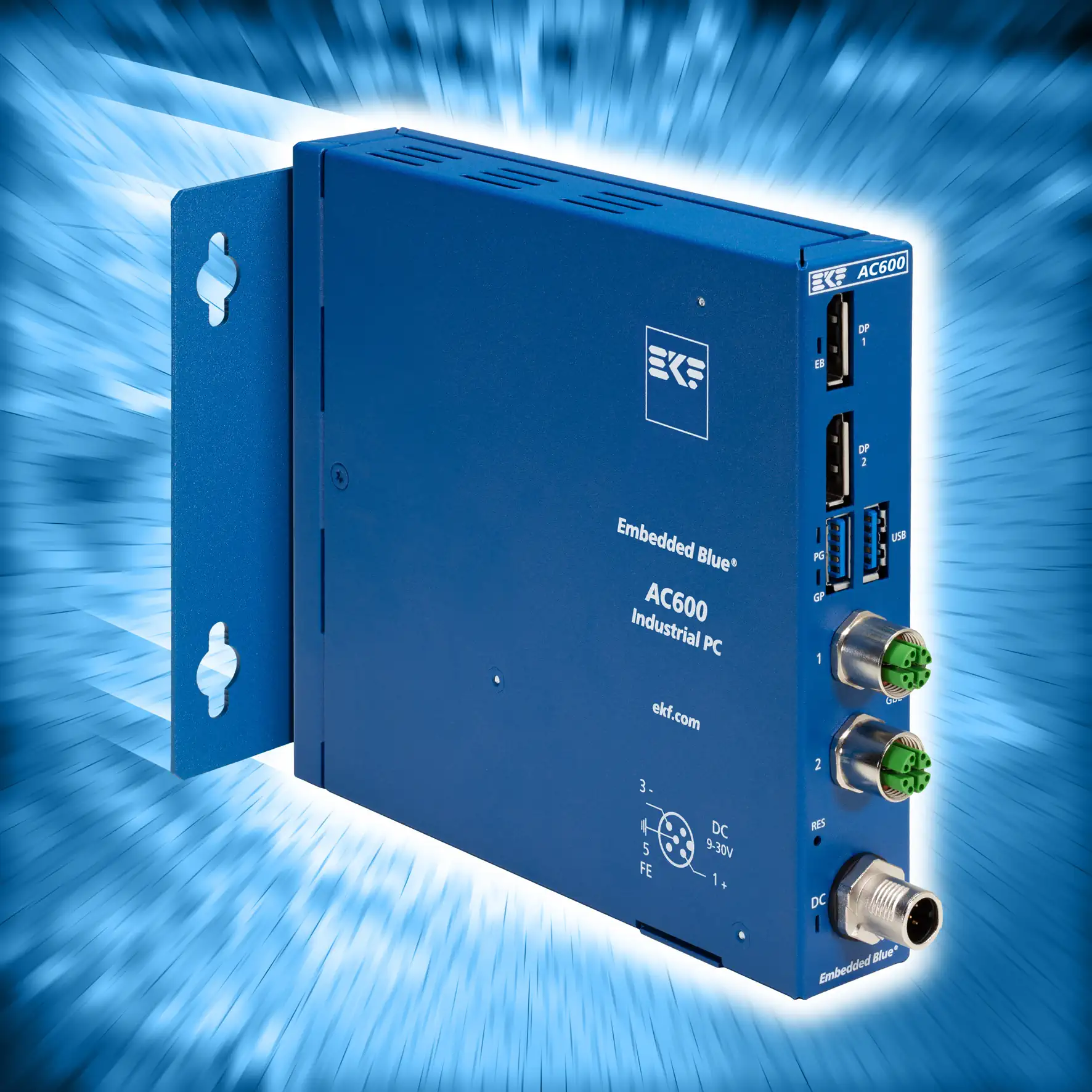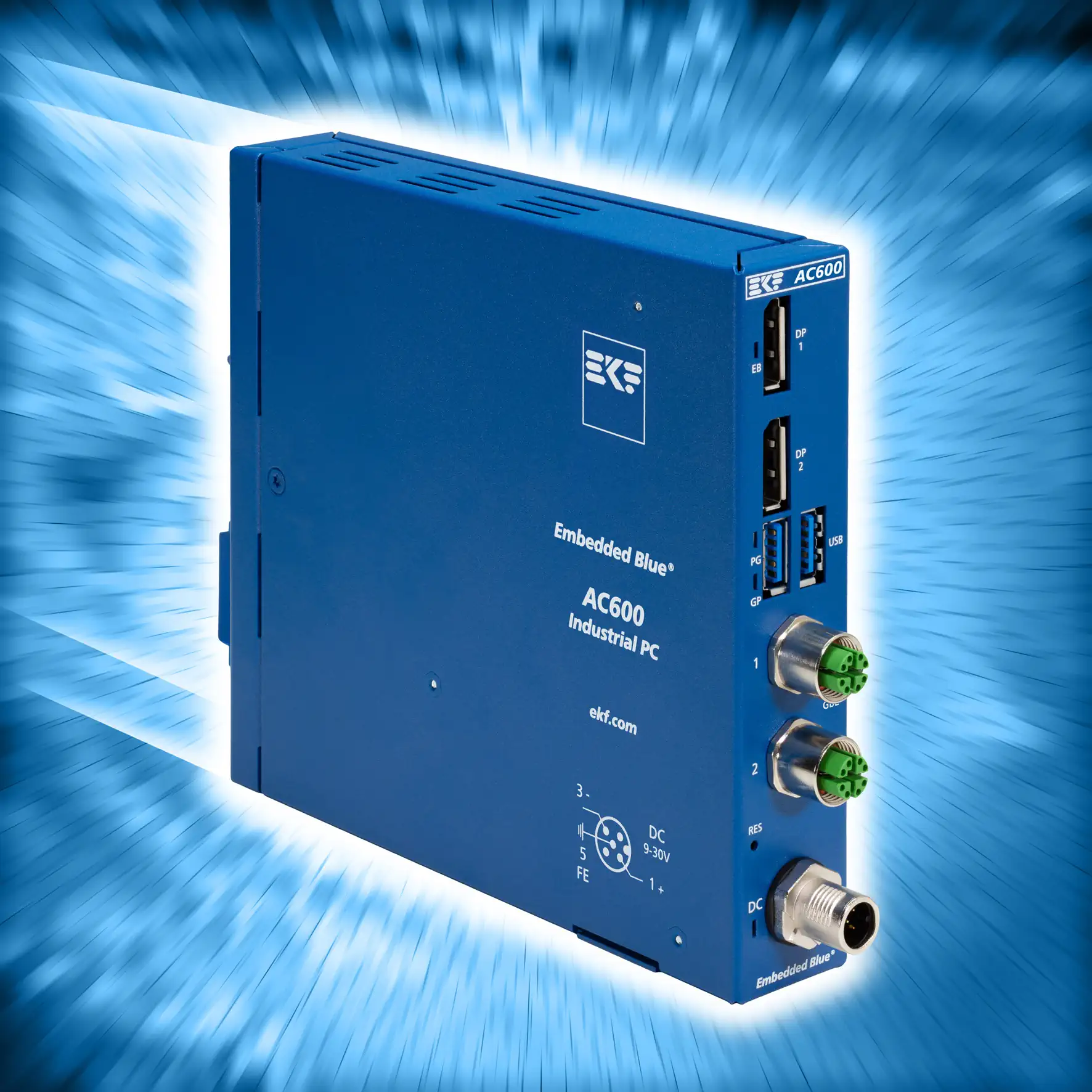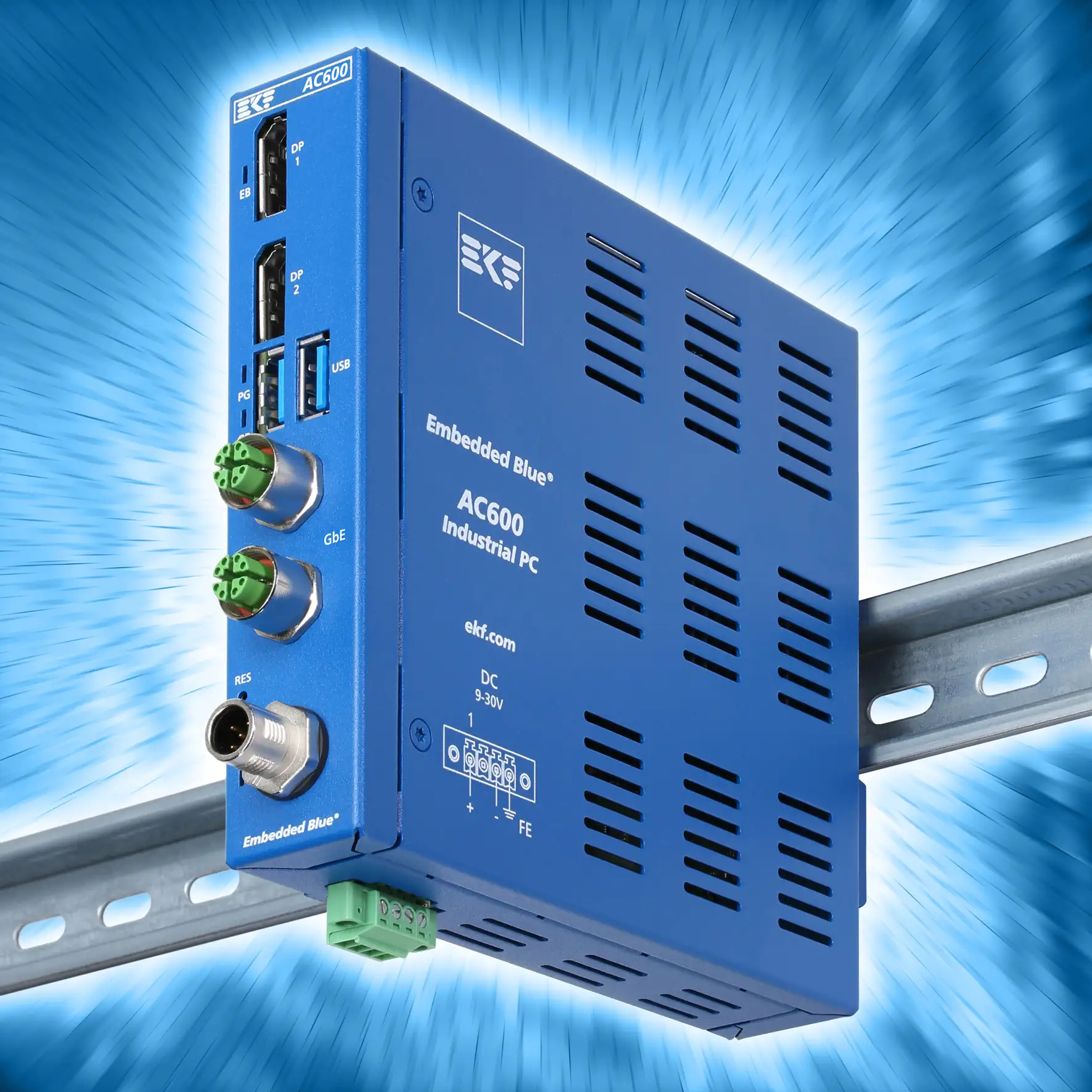AC600 • AC610
Embedded Blue® Boxed Solutions • Intel® Atom™ E3900 Series Processor • Apollo Lake SoC
As a member of their Embedded Blue® DIN Rail series, EKF presents the AC600/AC610, both fully featured industrial PCs. The box is equipped with an Intel® E39xx processor, and offers two connectors each for DisplayPort monitors, USB3 and M12-X Gigabit Ethernet at the front. The AC600/AC610 is provided with 8GB ECC RAM and a PCIe® SSD. The M12 power input connector accepts 9-57VDC. The AC610 has M.2 sockets to accommodate wireless communication modules. Wi-Fi 6 (ax) and Bluetooth are available as well as 5G/LTE WWAN and GNSS. External antennas can be attached via front panel SMA connectors.
The AC600/AC610 is a high reliable solution for industrial environments as well as transportation and railway.
Downloads & Ressources
Documents
Firmware
Firmware Update
Release Notes
=========================================================
Release Notes for Phoenix UEFI/BIOS Firmware on EKF AC600
=========================================================This file describes changes, extensions and bug fixes made in Phoenix UEFI/BIOS
for EKF AC600. For any further questions contact EKF at:
Email : support@ekf.de
Internet : www.ekf.com===================================================================================================================
2024-07-03: UEFI/BIOS production release, Build #160
– Updated CSE firmware from 3.1.70.2334 to 3.1.94.3086
– Reverted PMC firmware to 03.1F.00_PROD to fix SD Card compatibility problems observed with 03.21.00_PROD
– Fixed BIOS sometimes shows wrong CPU board hardware revision
– Additionally show CPU board hardware revision in SMBIOS type 2
– Modified red LED GP status information
– Added EFI Shell tool ‘EkfCmos’
– Updated EFI Shell tool ‘EkfReset’
– Modified some GPIO initializations appropriate for CPU sleep states
– Modified and extended custom specific defaults
===================================================================================================================
2024-01-09: UEFI/BIOS production release, Build #154
– Updated PMC firmware to version 03.21.00
– Updated CPU microcode to version 72 (0x48) for Apollo Lake E39xx D0 stepping
– Updated CPU microcode to version 40 (0x28) for Apollo Lake E39xx F1 stepping
– Fixed that BIOS Setup must be called at least once before a legacy OS boot (DOS, FreeDOS, etc.) can happen
– Boot Option ROMs, located in EEPROM of Marvell PCI SATA Controller (9170 or 9230), are now disabled by default
Setup (F2): Advanced -> SATA Configuration -> Option ROM Support for Marvell 9170
Available options: Disabled (Default), Enabled
Setup (F2): Advanced -> SATA Configuration -> Option ROM Support for Marvell 9230
Available options: Disabled (Default), Enabled– Modified feature “Skip UEFI Variable Write”
Setup (F2): Advanced -> Miscellaneous Configuration -> Skip UEFI Non-Volatile Variable Write
Available options: Disabled (Default), Enabled
Note the setting of this option is now disregarded when in BIOS Setup.
Setup option which controls “skip write of volatile variables” is removed.– Updated EFI Shell tool ‘EkfPci’
– Flash red LED GP (100 ms) to indicate end of DXE phase
– Changed RTC default date to 2024-01-01
– Modified and extended custom specific defaults
===================================================================================================================
2023-09-22: UEFI/BIOS production release, Build #150
– Improved TPM device detection
– Added support for TPM device change from fTPM to dTPM (if available) via Setup
Setup (F2): Advanced -> Security Configuration -> Select TPM device
Available options: Disabled, dTPM 2.0, fTPM (Default)– Current active TPM device is shown here:
Setup (F2): Advanced -> Security -> Current detected/selected TPM Device– Corrected board specific strings in certain Setup nodes
– Updated Setup nodes in Main -> System Information
– Added control modes for red LED GP in front panel
Setup (F2): Advanced -> Debug Configuration -> Select mode of red LED GP
Available options: Default (Default), Disabled, Mode 2– Added feature to skip UEFI variable write
Setup (F2): Advanced -> Miscellaneous Configuration -> Select Mode of ‘Skip UEFI Variable Write’
Available options: Disabled (Default), Mode 1 (NV var), Mode 2 (V var), Mode 3 (both types)– Updated EFI Shell tool ‘EkfPci’
– Updated EFI Shell tool ‘EkfReset’
– Updated EFI Shell tool ‘EkfDateTime’
– Now only Standard SMBIOS data is shown in EFI Shell tool ‘smbiosview’
– Setup node ‘System Date’ is now represented in ISO 8601 format
Setup [F2]: Main -> System Date– Converted ambiguous date format in EFI Shell and throughout the UEFI/BIOS to international date format according to ISO 8601
===================================================================================================================
2023-07-07: UEFI/BIOS production release, Build #146
– Added feature which issues an authentification prompt on call to Boot Menu
Setup [F2]: Security -> Authentification Prompt on Boot Menu
Available options: Disabled (Default), Enabled– Added feature which issues an authentification prompt on call to EFI Shell
Setup [F2]: Security -> Authentification Prompt on EFI Shell
Available options: Disabled (Default), Enabled– Added full support for boards with missing, empty or weak battery
Appropriate RTC and CMOS error messages can be suppressed by this Setup node
Setup (F2): Advanced -> Miscellaneous Configuration -> Ignore Battery Error
Available options: Disabled (Default), Enabled– Added feature to simulate an empty or missing battery
Setup [F2]: Advanced -> Debug Configuration -> Simulate empty Battery
Available options: Disabled (Default), Mode [1-4]– Added workaround if a Qualcomm device with PCI Vendor ID 0x168C and unexpected PCI device ID 0xABCD is detected
Setup [F2]: Advanced -> PCI Configuration -> Workaround for Qualcomm PCI device
Available options: Disabled (Default), Enabled
Setup [F2]: Advanced -> PCI Configuration -> Select max number of retries
Available options: Range 1-50, Default = 5
Setup [F2]: Advanced -> PCI Configuration -> Select Reset Type
Available options: Cold Reset (Default), Warm Reset– Added EKF EFI Shell command EkfPci (alias: epci, p)
Displays PCI devices one line per device. Shows PCI device configuration space in hex and decoded.– Added EKF EFI Shell command EkfDmpStore (alias: eds)
Displays UEFI variables one line per variable. Additionally manages UEFI variables.– Added EKF EFI Shell command EkfReset (alias: erst)
Reset, Shutdown or Restart system. Special option supports a timed controlled Restart.– Added EKF EFI Shell command EkfDateTime (alias: edt)
Shows date and time in ISO 8601 format. Useful in EFI Shell scripts.– Added eight more background colors for EFI Shell command cls
– Increased number of UEFI Shell screen history pages from 3 to 20
– Added support for “Warm Reset” for EFI Shell command reset
– Setup item “Select OS Reset Mode” now only used for ACPI/OS Reset mode
Setup [F2]: Advanced -> Board Configuration -> Select OS Reset Mode
Available options: Cold Reset (Default), Warm Reset– Changed RTC default date to 2023-01-01
– Fixed missing GPIO initialization
– Removed Secure Boot double Setup items
===================================================================================================================
2022-11-02: UEFI/BIOS production release, Build #144
– When jumper J-GP is inserted during boot additionally load default boot list
– Added Setup node to allow to perform a delay after every PostCode
Setup [F2]: Advanced -> Debug Options -> Delay after every PostCode
Available options: Disabled (Default), 1 ms, 2 ms, 5 ms, 10 ms, 20 ms, 50 ms– Added Setup node to allow to perform a delay after entering UEFI DXE phase
Setup [F2]: Advanced –> Miscellaneous Configuration –> Delay after first DXE Task
Available options: Disabled (Default), 0.5s, 1s, 1.5s, 2s, 3s, 4s, 5s
An appropriate delay can be used to improve the detection of attached graphic devices (e.g. KVM adapter).– Moved Setup node “Kernel Debugger Enable” to Setup [F2]: Advanced -> Debug Options
– Restructured SMBIOS menu
– Switched off red blinking GP LED immediately after system start
– 16 Bit Postcodes written to Port 80/81 (instead of 8 Bit Postcode to Port 80 only)
– Updated IGD Video BIOS to version 1016, EKF subversion 3
– Added Boot Option ‘System Reboot’
This feature is used to automatically reboot the system if all boot options above ‘System Reboot’ finished– TCO timer set to “No Reboot”
– PTT FPF is now permanently Enabled
– TPM items now shown in Security Page
– Changed RTC default date to 2022-01-01
===================================================================================================================
2020-10-09: UEFI/BIOS production release, Build #142
– Integrated new Phoenix code base 4.0.1.817
– Updated GOP driver to Version 10.0.1039
– Updated CPU microcode
===================================================================================================================
2020-08-11: First UEFI/BIOS production release, Build #140
===================================================================================================================
Specifications
- Low Power X86 based boxed PC, for DIN rail mount or wall mount
- Intel® Apollo Lake-I (APL-I) SoC E39xx processor series (scalable AC600/AC610 versions)
- Versatile standard front I/O connector suite (dual DisplayPort, dual USB 3.0, dual M12-X GbE)
- Choice of two versions – without (AC600) or with (AC610) wireless networking
- SMA/SMA-RP antenna connectors (AC610)
- Dimensions: 30mm (W) x 140mm (H) x 150mm (D) w/o DIN rail bracket (AC600)
- Dimensions: 40mm (W) x 140mm (H) x 150mm (D) w/o DIN rail bracket (AC610)
- Metal case, TS35 DIN rail bracket or wall mount plate
- M12 power connector
- Option terminal block power connector
- Option desktop power adapter connector
- Wide Range DC power input operation 9-57V
Simplified Block Diagram





